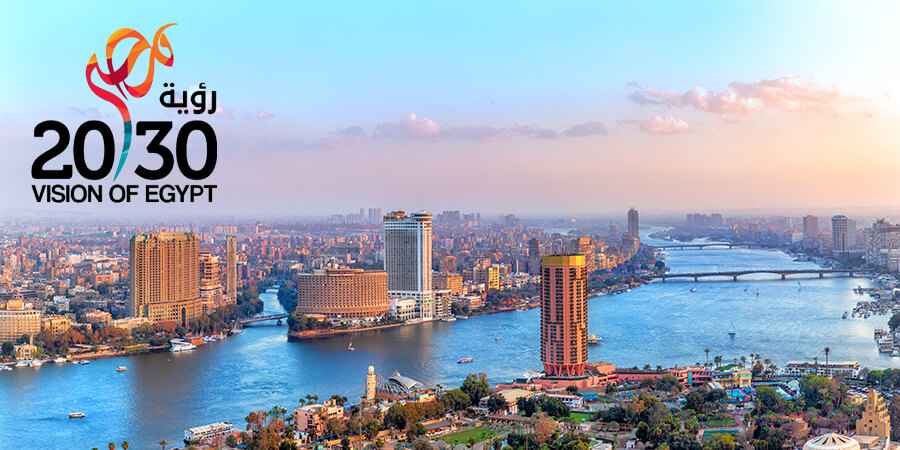Egypt Vision 2030 and Egypt's digital transformation strategy have inspired the Ministry of Communications and Information Technology (MCIT) to build “Digital Egypt”. Digital Egypt is an all-encompassing vision and plan, laying the foundations for the transitioning of Egypt into a digital society. To this end, Digital Egypt is built on three distinct tiers: digital transformation, digital skills and jobs, and digital innovation.
First of all, ICT plays an important role in developing the public sector for the advancement of societal services, and MCIT seeks to create public value, both for individual citizens (through easy access to government transactions and information) as well as for the government itself through the notion of doing more for less. Egypt has been adopting the positive strategy in transforming the existing government services to an entirely digital and data-driven ecosystem in order to provide public services in a faster and simpler way. Thus, MCIT cooperates with all sectors of the state to achieve the first tier of digital transformation through two pillars: the services provided to citizens and the improvement of government performance.
All public services will be provided to citizens digitally nationwide, so Egyptian citizens anywhere in the country will be able to receive these services in a digital format. Also, several methods facilitating the online payment of service fees have been made available. In addition, several e-services have been developed and launched for a number of entities, including law enforcement, notarization, personal status, family courts, supply access, electricity management, and much more. Moreover, MCIT has launched several projects, implemented within the framework of Digital Egypt to make digital government services available to citizens through four outlets: 1) Digital Egypt e-platform, 2) mobile applications, 3) post offices and 4) citizen service centers.
Regarding the digital skills and jobs component, building the Egyptian Citizen’s readiness for the future and the digital transformation era is the first step in promoting Digital Egypt. In order to advance a digital society, the right human resources and level of expertise are necessary. The MCIT is focused on training and building capacities for all segments of society, including school and university students, graduates, professionals, women and individuals with disabilities (PWDs), as well as Arab and African youth. An integrated strategy has been developed to build a societal base of digital competencies. The training plan is implemented in cooperation with major technology companies and global universities to foster such competencies in all fields and at various levels, and to integrate traditional and remote digital learning models.
This strategy follows a ranked approach that starts with digital literacy, and proceeds to intermediate technology training programs and advanced technical training programs that, together, aim to prepare a generation of skilled technicians who are able to compete in the labor market. And at the top level of the training pyramid is the awarding of a specialized master's degree to thousands of learners every year through the Digital Egypt Builders Initiative (DEBI).
Last but not least, with regard to the final tier of digital innovation, MCIT seeks to build and foster an ecosystem that encourages entrepreneurship and spurs creativity. Moreover, it aims to drive sector growth, support sustainable national development and establish Egypt as an innovation hub in the region through research and development, innovation, and entrepreneurship in ICT. MCIT adopts effective policies on ICT-based innovation through concerted efforts among stakeholders, which include the government sector, academic and research institutions, financial institutions, the private sector, entrepreneurs and the support networks that incubate creative ideas and convert them into value-added products to meet the sustainable development challenges.
Digital Infrastructure
Developing the digital infrastructure is one of the bases upon which the three main pillars of Digital Egypt are built. For that, a new network of fiber optic cables is being laid to connect 32,500 government buildings across the nation, boosting communication speeds and making the system more resilient. To strengthen the information infrastructure, schools nationwide are also being connected within the fiber optic network to access high-speed Internet, and a plan is currently in place to connect villages with these fiber optic cables to likewise boost Internet access.
Additionally, MCIT launched several major projects to improve the quality of fixed broadband, helping improve the country’s ranking on global indices. Using the Speedtest Global Index for January 2022, Egypt had the fastest fixed broadband internet speed in Africa at 35.67 Mbps. To bolster communication services, main roads and certain areas in governorates have been covered with mobile networks. The mobile services provided to citizens are also being improved by speeding up the issuance of permits for building cell towers for mobile operators, in addition to offering new frequencies that improve network efficiency and communication service quality.
As soon as people begin to use these digital transformation services, they’ll quickly see the benefits of this great change. They'll be able to receive and make payments, secure loans and save money on transport costs. And importantly, they'll find these services to be secure and easy to use. Indeed, Egypt might just be a sleeping tech giant, one with the potential to have a large global impact. One thing's for sure: Egypt is changing fast.







